[SUPER RICH] Cash for victory
Soccer superstars become pawns for billionaire club owners
By Korea HeraldPublished : June 2, 2014 - 21:00
With only weeks until the Brazil World Cup kicks off, there are some people who are more excited than anyone else: the superrich of the soccer world.
Soccer leagues have emerged as a popular playground for the world’s wealthiest, increasingly so since 2000.
While players are training hard to get in shape and fans are obsessively predicting which teams will make it through to the next round, the superrich sit inside their private jets or luxury suites and spend time either talking with the players that they sponsor or contemplating which players to sign next season.
A game for royal families
Mansour bin Zayed Al Nahyan, commonly known as Sheikh Mansour, owns the Premier League’s Manchester City and is often mentioned as the wealthiest man in soccer.
In just the seven years since he acquired the team in 2008 through Abu Dhabi United Group, Sheikh Mansour has transformed the team into one of the world’s best.
Born into the United Arab Emirates’ royal family, he is the nation’s current deputy prime minister and also a member of the Supreme Petroleum Council and the Abu Dhabi Investment Authority.
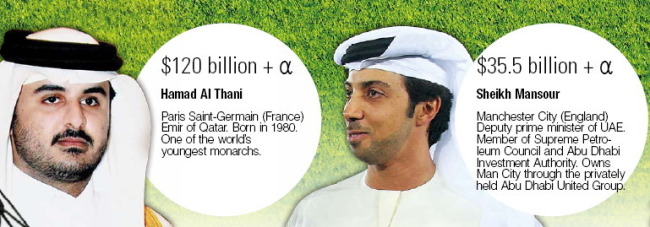
There is one other figure in the soccer industry who can compete with Sheikh Mansour ― the owner of Paris Saint-Germain, Tamim bin Hamad Al Thani.
Born in 1980, he is the emir of Qatar and the world’s youngest monarch besides Kim Jong-un of North Korea.
He is also the founder of Qatar Sports Investments through which he acquired PSG.
His assets are estimated to be around $3 billion-$10 billion, but this holds little significance because his stake in the Qatar Investment Authority alone amounts to over $120 billion.
From oil and fertilizer tycoons to foreign exchange specialists
Roman Abramovich, who owns Chelsea in the English Premier League, is a well-known oil tycoon. Having amassed a great wealth from the oil and gas industries since his early 20s, Abramovich owns Chelsea via Millhouse, a private investment company. His assets are estimated to be about $14.2 billion.
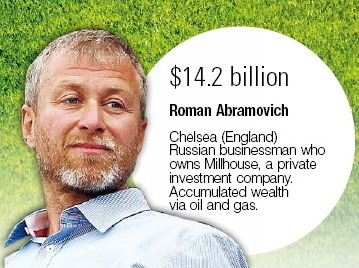
Alisher Usmanov, the largest shareholder of Arsenal, is also a well-known billionaire.
The Ukrainian-descent Russian business tycoon owns Metalloinvest (steel company), kommersant (media company), MegaFon (communications company) and Odnoklassniki (web portal). His assets are roughly at $18.6 billion.
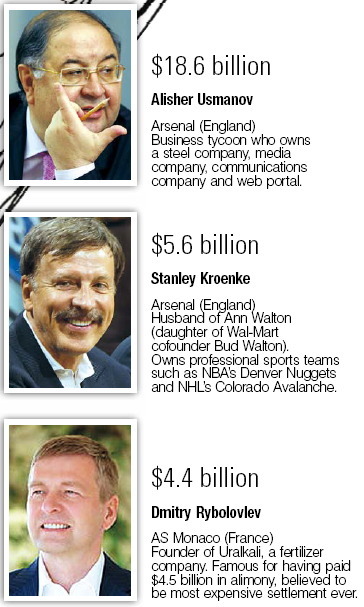
He owns several sports teams such as the NBA’s Denver Nuggets, NHL’s Colorado Avalanche and NFL’s St. Louis Rams through Kroenke Sports Enterprises. His assets are approximately $5.6 billion.
Malcolm Glazer, owner of Manchester United, is a Lithuanian-descent American businessman who owns First Allied Corporation, a company that invests in food processing, health, insurance and energy exploration. Glazer also owns the NFL team Tampa Bay Buccaneers.
AC Milan of Italy is owned by former Italian Prime Minister Silvio Berlusconi, who runs a total of 38 companies, including Mediaset S.p.A. With roughly $9 billion in assets, Berlusconi shares many similarities with South Korean family-owned conglomerates.
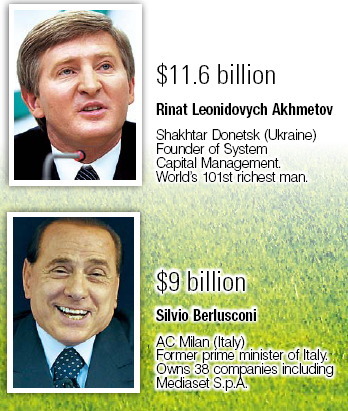
The owner of Shakhtar Donetsk, a leading team from the Ukrainian Premier League, is Rinat Leonidovych Akhmetov, the founder of Ukraine’s largest investment-finance company, System Capital Management, and also the world’s 101st richest man as named by Forbes.
Meanwhile, Dmitry Rybolovlev, who owns the team AS Monaco, founded the fertilizer firm Uralkali.
Joe Lewis, the owner of Tottenham Hotspur, made the bulk of his wealth through foreign exchange investments. Through ENIC, an investment company that specializes in the sports and media sectors, he also owns the Scotland-based Rangers F.C., Greece-based A.E.K. Athens F.C. and Switzerland-based FC Basel.
Why soccer?
To begin with, it might be because of the natural interest men have in the sport.
But more importantly, analyses reveal that the recruiting process, along with victory, is comparable to commanding an army ahead of a battle.
Some also seek to expand their political and business presence through soccer.
In the case of Mansour, for instance, Manchester City is helping him build a favorable reputation in the Middle East and Europe.
Moreover, unlike baseball or the Olympic Games, soccer is more of a global sport. Even the poorest developing countries operate soccer teams.
In the meantime, as capital flows into the sport, the value of the soccer industry grows each day.
Real Madrid, the world’s best soccer club for 2014 according to Forbes, is valued at near $3.44 billion. The global market for soccer equipment is estimated to exceed 15 trillion won ($14.67 billion) this year and FIFA is expected to rake in over 2 trillion won of profit from the Brazil World Cup.
By The Korea Herald Special Investigative Team
Hong Seung-wan
Sung Yeon-jin
Do Hyun-jung
Bae Ji-sook
Kim Joo-hyun
Soccer leagues have emerged as a popular playground for the world’s wealthiest, increasingly so since 2000.
While players are training hard to get in shape and fans are obsessively predicting which teams will make it through to the next round, the superrich sit inside their private jets or luxury suites and spend time either talking with the players that they sponsor or contemplating which players to sign next season.
A game for royal families
Mansour bin Zayed Al Nahyan, commonly known as Sheikh Mansour, owns the Premier League’s Manchester City and is often mentioned as the wealthiest man in soccer.
In just the seven years since he acquired the team in 2008 through Abu Dhabi United Group, Sheikh Mansour has transformed the team into one of the world’s best.
Born into the United Arab Emirates’ royal family, he is the nation’s current deputy prime minister and also a member of the Supreme Petroleum Council and the Abu Dhabi Investment Authority.

There is one other figure in the soccer industry who can compete with Sheikh Mansour ― the owner of Paris Saint-Germain, Tamim bin Hamad Al Thani.
Born in 1980, he is the emir of Qatar and the world’s youngest monarch besides Kim Jong-un of North Korea.
He is also the founder of Qatar Sports Investments through which he acquired PSG.
His assets are estimated to be around $3 billion-$10 billion, but this holds little significance because his stake in the Qatar Investment Authority alone amounts to over $120 billion.
From oil and fertilizer tycoons to foreign exchange specialists
Roman Abramovich, who owns Chelsea in the English Premier League, is a well-known oil tycoon. Having amassed a great wealth from the oil and gas industries since his early 20s, Abramovich owns Chelsea via Millhouse, a private investment company. His assets are estimated to be about $14.2 billion.

Alisher Usmanov, the largest shareholder of Arsenal, is also a well-known billionaire.
The Ukrainian-descent Russian business tycoon owns Metalloinvest (steel company), kommersant (media company), MegaFon (communications company) and Odnoklassniki (web portal). His assets are roughly at $18.6 billion.

He owns several sports teams such as the NBA’s Denver Nuggets, NHL’s Colorado Avalanche and NFL’s St. Louis Rams through Kroenke Sports Enterprises. His assets are approximately $5.6 billion.
Malcolm Glazer, owner of Manchester United, is a Lithuanian-descent American businessman who owns First Allied Corporation, a company that invests in food processing, health, insurance and energy exploration. Glazer also owns the NFL team Tampa Bay Buccaneers.
AC Milan of Italy is owned by former Italian Prime Minister Silvio Berlusconi, who runs a total of 38 companies, including Mediaset S.p.A. With roughly $9 billion in assets, Berlusconi shares many similarities with South Korean family-owned conglomerates.

The owner of Shakhtar Donetsk, a leading team from the Ukrainian Premier League, is Rinat Leonidovych Akhmetov, the founder of Ukraine’s largest investment-finance company, System Capital Management, and also the world’s 101st richest man as named by Forbes.
Meanwhile, Dmitry Rybolovlev, who owns the team AS Monaco, founded the fertilizer firm Uralkali.
Joe Lewis, the owner of Tottenham Hotspur, made the bulk of his wealth through foreign exchange investments. Through ENIC, an investment company that specializes in the sports and media sectors, he also owns the Scotland-based Rangers F.C., Greece-based A.E.K. Athens F.C. and Switzerland-based FC Basel.
Why soccer?
To begin with, it might be because of the natural interest men have in the sport.
But more importantly, analyses reveal that the recruiting process, along with victory, is comparable to commanding an army ahead of a battle.
Some also seek to expand their political and business presence through soccer.
In the case of Mansour, for instance, Manchester City is helping him build a favorable reputation in the Middle East and Europe.
Moreover, unlike baseball or the Olympic Games, soccer is more of a global sport. Even the poorest developing countries operate soccer teams.
In the meantime, as capital flows into the sport, the value of the soccer industry grows each day.
Real Madrid, the world’s best soccer club for 2014 according to Forbes, is valued at near $3.44 billion. The global market for soccer equipment is estimated to exceed 15 trillion won ($14.67 billion) this year and FIFA is expected to rake in over 2 trillion won of profit from the Brazil World Cup.
By The Korea Herald Special Investigative Team
Hong Seung-wan
Sung Yeon-jin
Do Hyun-jung
Bae Ji-sook
Kim Joo-hyun
-
Articles by Korea Herald




![[AtoZ into Korean mind] Humor in Korea: Navigating the line between what's funny and not](http://res.heraldm.com/phpwas/restmb_idxmake.php?idx=644&simg=/content/image/2024/04/22/20240422050642_0.jpg&u=)




![[Herald Interview] Why Toss invited hackers to penetrate its system](http://res.heraldm.com/phpwas/restmb_idxmake.php?idx=644&simg=/content/image/2024/04/22/20240422050569_0.jpg&u=20240422150649)

![[Graphic News] 77% of young Koreans still financially dependent](http://res.heraldm.com/phpwas/restmb_idxmake.php?idx=644&simg=/content/image/2024/04/22/20240422050762_0.gif&u=)



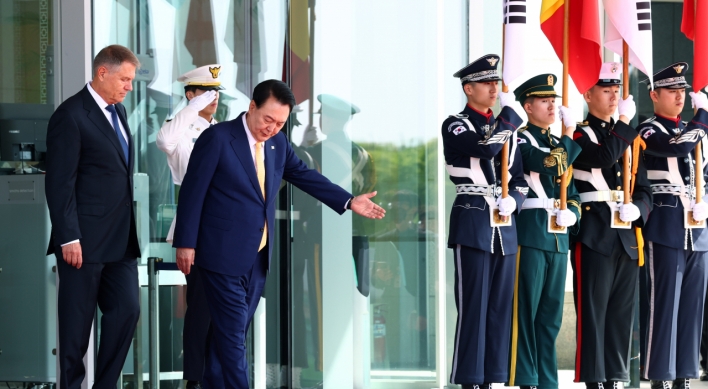
![[Exclusive] Korean military set to ban iPhones over 'security' concerns](http://res.heraldm.com/phpwas/restmb_idxmake.php?idx=652&simg=/content/image/2024/04/23/20240423050599_0.jpg&u=)



